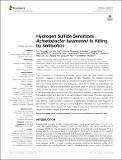Hydrogen Sulfide Sensitizes Acinetobacter baumannii to Killing by Antibiotics
Author(s)
Ng, Say Kong; Ong, Kai Xun; Surendran, Smitha Thamarath; Sinha, Ameya; Lai, Joey Jia Hui; Chen, Jacqueline; Liang, Jiaqi; Tay, Leona Kwan Sing; Cui, Liang; Loo, Hooi Linn; Ho, Peiying; Han, Jongyoon; Moreira, Wilfried; ... Show more Show less
DownloadPublished version (1.162Mb)
Publisher with Creative Commons License
Publisher with Creative Commons License
Creative Commons Attribution
Terms of use
Metadata
Show full item recordAbstract
The production of endogenous hydrogen sulfide (H₂S) has been shown to confer antibiotic tolerance in all bacteria studied to date. Therefore, this mediator has been speculated to be a universal defense mechanism against antibiotics in bacteria. This is assuming that all bacteria produce endogenous H₂S. In this study, we established that the pathogenic bacteria Acinetobacter baumannii does not produce endogenous H₂S, giving us the opportunity to test the effect of exogenous H₂S on antibiotic tolerance in a bacterium that does not produce it. By using a H₂S-releasing compound to modulate the sulfide content in A. baumannii, we demonstrated that instead of conferring antibiotic tolerance, exogenous H₂S sensitized A. baumannii to multiple antibiotic classes, and was able to revert acquired resistance to gentamicin. Exogenous H₂S triggered a perturbation of redox and energy homeostasis that translated into hypersensitivity to antibiotic killing. We propose that H₂S could be used as an antibiotic-potentiator and resistance-reversion agent in bacteria that do not produce it.
Date issued
2020-08Department
Singapore-MIT Alliance in Research and Technology (SMART); Massachusetts Institute of Technology. Department of Biological Engineering; Massachusetts Institute of Technology. Department of Electrical Engineering and Computer ScienceJournal
Frontiers in Microbiology
Publisher
Frontiers Media SA
Citation
Ng, Say Kong et al. "Hydrogen Sulfide Sensitizes Acinetobacter baumannii to Killing by Antibiotics." Frontiers in Microbiology 11 (August 2020): 1875 © 2020 The Authors
Version: Final published version
ISSN
1664-302X